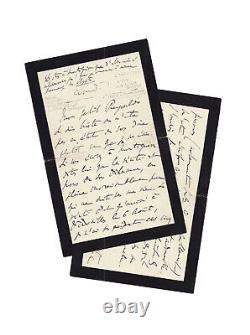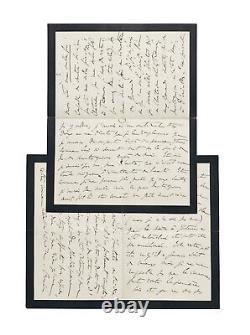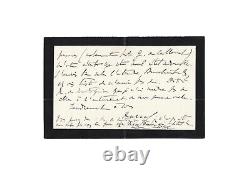
- Homepage
- Author
- Alfred Bruneau (3)
- Anatole France (3)
- Auguste Maquet (3)
- Beydts (louis) (4)
- Camille Mauclair (3)
- Charles Monselet (3)
- Chateaubriand (5)
- Ernest Daudet (3)
- Henri Barbusse (3)
- Jean Couty (3)
- Jean-léon Gérôme (5)
- Louise Read (4)
- Marcel Proust (5)
- Paul Chabas (4)
- Paul Meurice (3)
- Proust (3)
- Roger Martin Du Gard (4)
- Salomon Reinach (3)
- Sully Prudhomme (7)
- Violette Leduc (4)
- Other (3994)
- Binding
- Condition
- Era
- 18th Century (11)
- 1900 To 1960 (60)
- 1930s (4)
- 1960s (5)
- 1970s (7)
- 19th (5)
- 19th Century (48)
- 20th Century (15)
- Beautiful Era (12)
- Belle Epoque (49)
- First Empire (8)
- Nineteenth (19)
- Nineteenth Century (11)
- Post-war (21)
- Restoration (17)
- Revolution (4)
- Roaring Twenties (28)
- Second Empire (21)
- Second World War (5)
- World War Ii (9)
- Other (3710)
- Language
- Theme
Marcel Proust / Autographed letter signed to Reynaldo Hahn / Montesquiou / Charlus





Handwritten letter signed "Marcel" to Reynaldo Hahn S. D "Monday" [7 January 1907]. In-8° on two bifolia, written on both sides in black ink, mourning paper, watermarked "L. & C°" Small pencil annotations in the upper margin of the first leaf, traces of period folds due to folding. Slight ink smudges on the first bifolium indicating a folding by Proust while the ink was not yet dry.
A long and rich letter to Reynaldo Hahn, his "Bunchnibuls", regarding his relationships with Robert de Montesquiou and the deceased lover of the latter, Gabriel de Yturri. A remarkable testimony of intertwined relationships, each of the people mentioned here inspired Proust for major characters in In Search of Lost Time.
"If you write to Montesquiou, tell him that the truth is beyond his dilemma, completely implausible for someone who does not know my life. I am sad not to be able to tell you what I am writing sooner. If you write to Montesquiou, tell him that the truth is beyond his dilemma, completely implausible for someone who does not know my life. The truth is that, arriving in Versailles on August 6, I have not been able to go out once during these five months. I have not been to the Château once, not once to Trianon (but then you know all this well), not once to the Gonards cemetery.
If I had had just one good day, I would have gone to the Gonards rather than the Château and Trianon, especially since Mr. De Montesquiou was not in Versailles, not able to go there, I would have had a very sweet feeling telling myself that I was standing in for him [,] that I was coming on his behalf to the poor Yturri as he so often came on behalf of Mr. And then I knew through you, through others, that it was a unique tomb of emotion and beauty. And as I think mostly of tombs now, I would have liked to see what Montesquiou had done there and how his taste had succeeded in giving even more nobility to his grief. When he returns to Paris or Versailles, I will take care of myself to try to see him one evening, but besides it being impossible for everyone, with him the difficulty grows even more, because he is the person in the world with whom I feel the most uncomfortable, in the negative sense of the word.And even if he agrees for once to my hours, the possibility of an untimely crisis will prevent me from daring to give him an appointment that I would rather die than break, while others would understand. You can tell him that I was very happy to receive the blue Hydrangeas that I had never loved so much. The pieces at the beginning seemed more exquisite than before. As for the Ancilla of which I applied this fragment to you recently.
It is a wonderful thing, a magnificent pendant to The servant with the great heart. It seems to me (but I am not sure) that the piece to Yturri has been retouched and may not have been improved. It may still be the best thing he ever wrote but I do not remember the crown being green the first time and I do not know if it is better this way. There is no need to tell him this, firstly because he wouldn't care at all, and secondly because it is a very vague doubt, and I am not at all sure I am right. Have you been interviewed by Les Lettres about Shakespeare Tolstoy.
I am too unwell to answer, I cannot tell you how much just a letter like this exhausts me. Several people, especially Me G. De Caillavet, wrote to me that your Christmas was adorable. I would have loved to hear it, Bunchnibuls, and am sad not to have been able to.
I couldn't even go to the funeral of my poor uncle. De Montesquiou that I have not been well enough even once to see Miss Deacon who lived in the same hotel. Tell Montesquiou that besides, he won't be interested that I am beginning to love objects a lot. 1- Letter dated only Monday; must be dated either Monday 31 December 1906 or Monday 7 January 1907: reference to news that Proust received about a performance of the recipient's Christmas (see note n°9 below).2- In a letter to Montesquiou dated 18 November 1905, Proust apologized for not being able to attend the inauguration of the monument in honor of Gabriel de Yturri: "I would have liked my strength to allow me to join the small group." Deceased on 11 December 1921, Robert de Montesquiou was buried in the same vault as his companion. 3- By slip of the pen, Proust repeats "with him. Definitive edition with portrait of the author based on a painting by Laszlo. It is the first volume of the definitive work of the poet, published in December 1906 by Georges Richard, 7, rue Cadet.
The first edition of the work was published in 1896. 5- In a letter to Montesquiou dated 13 December 1906, Proust quoted a few lines from Montesquiou that he had slightly modified. 6- Baudelaire, The Flowers of Evil, Parisian Pictures, t. 100: The servant with the great heart of whom you were jealous, And who sleeps his sleep under a humble grass, We should still bring her some flowers. 7- Allusion to the sonnet In Memoriam, which Montesquiou placed after the preface of the collection in question, a piece entitled In memory of Gabriel de Yturri. It begins: My feelings for You are proud to be eternal; They have lasted long enough to prove themselves Serious, in joy, and, serene, under trial, And, without ever lying to fraternal agreements. Each of us had the right to his green crown: Mine, I hope for it, and wait for it, without excitement; Yours, if, in advance, here, I give it to you, Receive it without trouble, holding it from me. 8- The magazine Les Lettres had asked a few French writers and artists for their opinion on this judgment of Tolstoy, reported by Georges Bourdon in his book Listening to Tolstoy (1904). 9- Allusion to the performance given at Mme Madeleine Lemaire's on Christmas Eve. It apparently refers to the Christmas Pastorale, a one-act mystery play by Arnous Grevan, adapted by Leonel de La Tourasse and Taurines, with piano accompaniment by Reynaldo Hahn. 10- This refers to Georges Denis Weil, brother of Jeanne Weil-Proust. The funeral took place on 27 August 1906. It was Robert Proust, Marcel's brother, who attended to mourn. 11- Gladys-Mary Deacon, daughter of Edward Parker Deacon and Florence Baldwin. 12- A pun, it seems, alluding to both knick-knacks and Montesquiou's poem titled Objects.The Blue Hydrangeas, LXXVI of the 1896 edition; LXXII of the definitive 1906 edition. A letter from Hahn addressed to Montesquiou (now in the Montesquiou collection at the BnF), sent the next day or the day after, in which he forwards Proust's request: "Dear Sir / I have passed on your letter to Marcel. I am sending you his response [this present letter].
I have not seen him for several days. It is unfortunately true that he has not been out once, in Versailles [. It was at Madeleine Lemaire's on 13 April 1893 that Marcel Proust met Robert de Montesquiou. The latter, depicted as the Baron de Charlus in In Search of Lost Time, a character with an irascible temperament and sharp wit, made a completely different impression on Proust during this first meeting.
A dandy with a pure profile and an entrancing gaze. Proust falls under Montesquiou's admiration, and a current of sympathy is established between them.This admiration is followed by a friendship that will last until the dandy-poet's last days in 1921. Montesquiou is known to have had only one affair: that with his beloved and mourned secretary, Gabriel de Yturri, who died of diabetes on 6 July 1905. The latter was Proust's sole model for the character of Jupien in In Search of Lost Time. Literary and historical autographs, Letters from Marcel Proust [Marie Nordlinger] (Drouot, 15 and 17 December 1958, lot 188). After Reynaldo Hahn, his cousin Marie Nordlinger, who had helped Marcel Proust in his translation of Ruskin, inherited it.
VII, Kolb, Plon, n°5 Letters to Reynaldo Hahn, ed. Marcel Proust I - Biography, Jean-Yves Tadié, Folio, pp.

